Project management is one of the most sought fields offering a wide range of opportunities in almost every industry. Big giants are already investing in large projects. For this purpose, the demand for project management roles will continue to grow. Although you do not know what to expect, therefore a project manager interview can be intimidating. The interviewer may ask you different types of questions to check your knowledge and skills from various perspectives. We have curated the 50 most asked project management interview questions to give you a sense of enhanced confidence.
Project Management Interview Questions
Q1. Tell about yourself.
A very commonly asked question in any interview. This question opens the chance to describe yourself and your story in your own words. Thus, creating the first impression that often decides the flow of the whole interview.
Q2. Why should you be hired for this role?
In this project management interview question, you are judged on your confidence and willingness to adapt. This is an opportunity to express how perfectly you fit the job profile requirements. Simultaneously reflect your keenness and readiness to learn the cosmetic gaps.
Q3. What are your strength and weakness?
This is a one of the common project management interview questions asked to find out if you are open to improvement. And whether you are clear about your strengths. You are not expected to present yourself as a perfectionist. In fact, state your weaknesses as areas that need improvement. Likewise, present your strengths in line with the requirements of the job.
Q4. What defines you -A leader or a Manager?
Leaders bring the best out of the team members while motivating, directing, and managing them. Therefore, the project management interview answers should assure the interviewer that delegating responsibility comes naturally to you.
Q5. How will you manage your team while working from home, the new normal in post-COVID-19?
In today’s environment, project managers often select their staff from a global workforce and are expected to manage teams remotely. They should have the experience and expertise to work virtually with team members. In project management interviews, especially acknowledge the stress and concerns of team members.
Basic Knowledge PMP Interview Questions
Q6. What is your ideal project for you?
While answering project management interview question, it is important to understand the intent of the interviewer. There is nothing like an ideal project. But some specific areas of work might excite you. Therefore, your answer should narrow down choices that maximize your productivity.
Q7. What are some important skills that a Project Manager should possess?
The answers in an interview should reflect your knowledge as well as experience. Some of the essential qualities of a Project Manager are leadership skills, effective communication, team management, domain knowledge etc.
Q8. Describe the triple constraint triangle in project management.
Every project has certain risks that must be managed for a project to be successful. In this one of the project management interviews, the triple Constraint Triangle is a delicate balancing act of three components. It is a combination of the project’s scope, time, and budget. Thus, a project manager should ensure that team delivers within the scope of the project and deadlines. Furthermore, the project doesn’t exceeds the budget but definitely exceeds customer satisfaction.
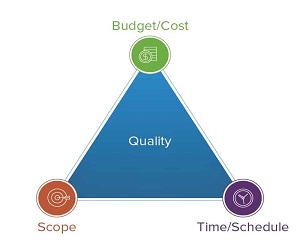
Project Management Questions on Time Management
Q9. How will prioritize tasks in your project?
It is crucial to prioritize tasks to finish the project within the deadlines. In this project management interview question, your answer should include time management skills when juggling multiple tasks. The interviewer also expects your answer to reflect your team management skills, handling stakeholders’ needs, and most importantly knowing what to prioritize is key to a project.
Q10. What are Work in progress (WIP) limits? How can you use it to deal with the bottlenecks in a project?
A bottleneck in the project slows down its progress and causes delays. Work-in-progress limits, a project management strategy can prevent any bottlenecks in the project’s progress. Thus, it aims to reduce the waste incurred in excessive meetings, duplication of tasks, redundancy, rework, missed deadlines, sometimes context switching, etc. Hence, setting a limit on the total workflow makes sure that the resources are well utilized to reduce time and effort.
Q11. What is the purpose of the RACI Matrix in resource management?
The RACI matrix is a responsibility assignment chart used to map out every task, goal, and key decision needed to complete a project. Since so many stakeholders are engaged in a project, therefore having clarity about the duties of every member helps in removing doubts and the chance of miscommunication.
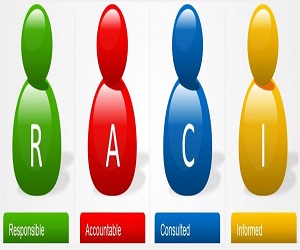
Experience-Based Project Management Questions
Q12. Can you talk about the successful project you worked on?
This project management interview question is asked to know what you consider success. A project can be perceived as successful in meeting goals, deadlines, and budgets. But success can also mean bringing out change. Take this opportunity to demonstrate the key elements that led to the success of you and your team. Further, you can describe the important information about the project, like the overall goal, team size, and how you approached it.
Q13. What are the challenges faced in a project?
This is one of the asked project management interview question. An issue can cause serious damage to the project and its efficiency. The following are a few issues faced in a project:
1. Clarity regarding the objectives of the project.
2. Lack of communication skills.
3. Proper budget allocation for the project.
4. Inadequate skilled resources.
5. Lack of accountability among the team members.
6. Inadequate risk management.
7. Lack of schedule management.
Q14. How do you deal with changes to your project?
Change is an inevitable part of any project. The better approach to deal with change is to adapt quickly. Therefore, set up a change management plan long before the changes take place. As a project manager, it is imperative to be agile and adaptable to change. Simultaneously, regulatory changes, budget changes, timelines changes, and technology changes need to take corrective measures to resolve an issue.
Q15. Describe your experience as a project manager in your previous assignments.
In this project management interview question, you need to familiarise yourself with the industry standards. Also, need to display your academic or professional background in the best possible way. The response to this question decides the further flow of the interview.
Questions on Project Performance
Q16. What are performance reports?
Performance reports demonstrate the project’s current state and actual performance in contrast to the established baselines. While monitoring and controlling the project, the three types of reports mainly prepared are following:
- Progress Report
- Status Report
- Forecast Report
Q17. Explain the difference between project monitoring and project controlling.
Project monitoring includes identifying discrepancies between real project performances against the project baseline. On the other hand, project controlling entails detecting repair options for deviations and suggesting corrective actions. Therefore, both monitoring and controlling assist to keep projects on track from start to finish. These procedures need to be planned as a part of the project management plan for the project life cycle to go well.

Q18. How do you plan effective quality assurance for your project?
Quality assurance ensures the delivery of the project at the highest quality. The following are ways for effective quality assurance for your project:
- Defining and committing to the desired quality of the project.
- Consistency is important to meet the project requirements.
- Constant updates to manage and perform quality assurance practices.
Q19. What is Earned Value Management and how can it be implemented?
Earned value management (EVM) is a practical project management technique that measures project performance in relation to time, price, and scope. Since it gives clarity and control over the tasks in progress, thus aiding the team in responding to challenges on time.
- Planned Value – The budgeted amount that was initially allocated.
- Actual Cost – The real costs as of the current date of a project.
- Earned Value – A product of the total project cost and the percentage of the project completed.
Team Management Project Management Questions

Q20. How will you manage team development?
Mentoring and leadership are part of team development. This question in the project management interview is to understand your ability to lead the team with an example. Usually, even a competent team has some underperformance or disputes so as a project manager you can showcase examples of how you have inspired team members.
Q21. Have you ever experienced failures in your project and how did you handle this communication with your team?
Like success, failure is also a part of any project-handling process. This project management interview question aims to check your mental toughness to handle adverse situations. Therefore, here you can Illustrate how you treated a loss when your team reached a roadblock so that setbacks don’t damage the team’s morale. Also, they learn from failures and make sure not to repeat their next assignment
Q22. As a project manager, will you take help outside your project team?
This is another common project manager interview question. Of course, no one knows everything. Therefore, the response to such should be always positive. The answer should portray readiness to take the help of other employees of the organization for the success of the project.
Q23. How to manage conflicts between stakeholders and team members?
Conflicts are inevitable. Every project faces a few conflicts among team members and stakeholders This project management interview question is to judge your conflict management skills. Here, it is essential to be impartial while resolving conflicts rather than making assumptions. In such a scenario, a project manager should be a good listener to the team or stakeholders’ concerns. However, how you choose to handle it at the right time leads to project success.
Questions On Operational Knowledge
Q24. What is the project management life cycle process?
It is important to simplify the project into manageable steps for accomplishing project objectives. For this purpose, the following are the steps of the Project Management Life Cycle:
- Initiation – It is the first and most vital step where the initial scope of the project is defined and resources allocated.
- Plan — In this process, detailing of the project will be carried out. It estimates the cost, resources, and risks effectively.
- Execution- It is the process of putting the project plan into action.
- Closure — Finally, you sign off the project and hand over the project documents.
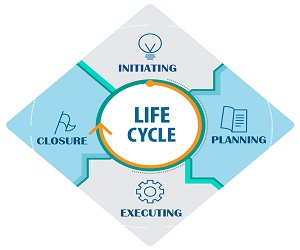
Q25. What is the preferred project management methodology you would use?
There are several ways of planning a based on the type of project you are handling. In this project management interview question, the project managers should have complete information about all these methods. Therefore, they have to wear many hats from conventional techniques to innovative methodologies to select the apt methodology.
Q26. What are the processes and the process group in the project management framework?
This project management interview question intends to test your operational knowledge. A process in the project management framework is a structured way of doing tasks for the successful completion of a project. It includes 49 processes, based on domain knowledge and technical skills to achieve the desired results. And a process group is a collection of processes that are carried out at various stages during the project.
Project Management Questions On Domain Knowledge
Q27. What is the Pareto principle analysis?
Pareto is a mathematical decision-making method. Also, known as the 80/20 principle. It is a management tool for successfully tracking problems and identification of a limited number of tasks. This method can help bring a significant overall impact. It helps to save a lot of time and effort, especially in large projects with several tasks.
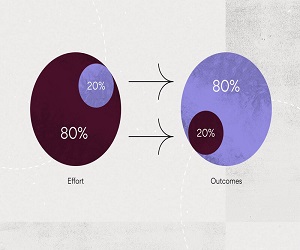
Q28. What is the concept of RAID in Project Management?
Risk, Actions, Issues, and Decisions are abbreviated as RAID in project management. It is a vital tool in the success or failure of any project. While addressing this project management interview question, you are expected to keep tabs on these four terms. And this will help you prepare for the things that could go wrong in the project.
Q29. What is Work Breakdown Structure (WBD)?
Work breakdown structure defines the work activities essential for the project. The structure of WBD follows a hierarchical pattern that segregates core activities into sub-activities.
Q30. What is the difference between trend analysis and variance analysis?
Variance analysis is the method of computing the difference between the projected performance and the actual performance. At the same time, trend analysis is used to identify the repeated patterns in the project. Thus, helping to take corrective action and get back on track.
Q31. What is Ishikawa or Fishbone diagram?
Ishikawa or Fishbone diagram is used to perform a root cause analysis for a particular problem. The essential advantage of this tool is clear visualization. In the project management interview, this question is asked to test your ability to analyse complex issues.
Questions On Project Testing
Q32. What is Project Baseline?
In any project, after the completion of a phase, you receive the client’s confirmation. So based on that you establish a baseline. And if further any changes, it is documented again.
Q33. What is System Testing?
The purpose of system testing is to evaluate all functional and non-functional criteria. The idea is not to check each component separately, but rather the whole system.
Q34. What is Acceptance Testing?
Acceptance testing ensures that the system fulfils the requirements. The objective is from the client’s perspective as he understands his business and requirements better.
Q35. Explain the term V-Model in testing.
The V-model establishes a link between the type of test and the stage of a project, i.e., which test should be run at what point of the project.
Q36. What is unit testing?
Unit testing’s main goal is to test individual units. It validates that the project phase meets dependable standards.
Q37. What is gold plating?
When the project scope is altered beyond what was originally agreed upon, is called the Gold plating technique. It involves adding enhancements to a project at the client’s request. It is crucial to assess the extent of the project objectively and deliver more than what is expected.
Q38. How do you use three-point estimating methods?
This is the best method to have estimates of your project. Here, in this project management interview question, you can explain this in three steps:
- Identify the positive and negative aspects involved in the project.
- Then make three estimates- Pessimist(P), Optimist(O) and Most Likely(M)
- Then the final step is to calculate using either of the methods:
- PERT or BETA Distribution E = (P+4M+O)/6
- Triangular Distribution E = (P+M+O)/3
Project Management Questions on Managing Risks

Q39. Can you explain the difference between risks and issues?
Risks represent uncertain events in the future that could bring a beneficial or adverse impact on the project goals. On the other hand, issues are current occurrences that impact the project objectives. Issues are often considered negative.
Q40. What are the most common risks that you may face in a project?
This is one of the frequently asked project management interview questions. Therefore, your answer should be well-versed. And would be better if you can cite examples based on your experiences. Some of the project-related risks can be market, cost, legal, external, operational risks etc.
Q41. How will you differentiate between Risk Probability and Risk impact?
Risk Probability denotes the likelihood of the risk arising in the project. While risk impact refers to the cost of a risk that could happen in a project. It measures the extent of damage in the event of a disaster.
Q42. What is your risk-mitigation strategy while managing a project?
During the project management interview, this question is to check your risk management skills. Whether you have the aptitude and attitude to handle the risk properly or not. The following are essential steps of the risk management process:
- Identification
- Assessment
- Prioritization
- Monitoring and Reporting
Q43. What are the advantages of risk management in project management ?
The benefit of risk management increases the chances of the successful completion of the project. Risk management controls the project’s risk and uncertainty. It allows us to identify potential hazards, how to handle them, and the expected cost to mitigate risks.
Questions on Managing Costs & Deadlines
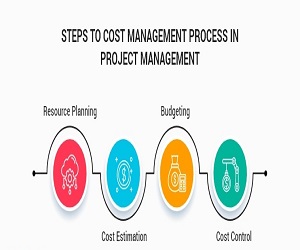
Q44. How would you plan the budget for a project?
In this project management interview question, you might be asked specifically about managing the budget of a project. Making a budget for any project includes cost estimation, funds allocation, recording expenditures, and planning for unexpected expenses. It would be great if you can cite some examples from past experiences.
Q45. What steps you will take to ensure the project finishes within the given timeline?
Managing a project involves detecting whether your project or falling behind the agreed timelines. Here, you can talk about following simple steps to check the actual progress of your project.
- Budget should be under control.
- Time consumption is worth its cost and effort.
- The scope of the project is intact.
- Work in progress is according to goals set.
Q46. How will you measure the progress of your project?
The following can help you measure if your project is off track and help you to bring it back on track:
- The unit’s completed method- It gives a clear perspective of the actual performance of the project.
- Incremental milestones tell you the exact point in your project’s standing.
- The 50/50 rule – It is also known as the start-to-finish rule.
- Cost ratio helps the project managers to know the costs and overheads associated with the progress of the project.
- Experience or opinion- The judgment of the project manager can also measure progress based on his experience and expertise.
- Weighted units of different subtasks also measure the progress of the project.
Project Management Questions on Customer Focus
Q47. How would you handle a difficult stakeholder?
This is one of the project management interview question that aims to get clarity into your communication and negotiation skills. Further, knowing your ability to manage conflicts. Since stakeholders have a strong say in the decisions of the project. So their consent is important. However, they can be challenging to handle sometimes because of disagreements. Therefore, a project manager must tactfully intervene and resolve. Hence, create an environment of trust and respect.
Q48. How would you handle your customer if dissatisfied by the end of the project?
To handle a dissatisfied customer, you must express your concern and make them feel that you value them. Further, try to understand their reason for dissatisfaction. Accordingly, try to implement the changes as per their expectations. If it is not possible, you explain to the customer with proper justification.
Q49. What are stakeholder analysis and Power-Interest Grid?
Stakeholder analysis involves preparing a list of all the prospective stakeholders who are related to the project in some way. A power-interest grid categorize stakeholders based on their significance and impact on the project.
Q50. What is the use of stakeholder analysis and Power-Interest Grid in project management?
A power-interest grid helps categorize stakeholders based on their importance and impact. Stakeholder analysis is the process of making a list of all the prospective stakeholders associated with the project. These two approaches help define the position of every stakeholder involved in the project.
Hope the above project management interview questions help you prepare. A skilled and experienced project manager always be in demand. The market is expanding at breakneck speed for Project Management-related jobs. Therefore, Henry Harvin provides PMP Certification Training Course to develop your career.
About Henry Harvin Project Management Course
Henry Harvin provides live and interactive learning through the best faculty and in-depth knowledge of the subject. This is an online as well as an offline course for project management professionals with a 100% money-back guarantee. Hence, you continue working at your current job while upgrading yourself for better prospects.
Conclusion
The project Manager is a very important role in any organization. So high priority should be given to interview preparation. These 50 project management interview questions are not an exhaustive list. However, we hope these PMP interview questions prove to be helpful resources in your interview preparation. In addition to this, we advise enrolling in a project management certification course to increase your chances of being selected for a dream job.
Recommended Reads:
FAQs
You need to have the right skills and knowledge of your subject. Further, you can pursue a course to become an SME.
Anyone can be a project manager, provided the individual has a strong aptitude and attitude.
A project manager handles a project entirely from start to end.



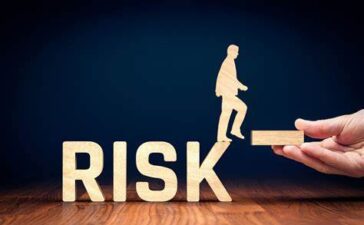












This is the best blog on project management interview questions. You have covered very good questions. Thanks for sharing.
Nice blog for the preparation of project management interview questions. Add more question so that we can take more advantage of your blog.
I landed on this page while I was scrolling to find the best Project management interview questions. This is the best blog to prepare for the PMP interview questions. Thanks for sharing.